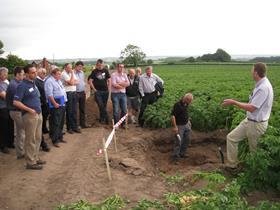
Cheshire potato growers joined forces to discuss how best to go forward with the local crop.
They met at Aston Grange Farm near Runcorn towards the end of last month at Potato Council’s Cheshire Potato event.
Opening the event, Potato Council’s director, Dr Rob Clayton, urged the industry to speak with ‘one voice’.
He said: 'The marketplace is crowded with competitive products, so our industry needs to be loud and proud, and join together to bang the drum with consistent messages about potatoes.
“Potato Council will continue to provide the evidence base, as we have a great story to tell. A potato is a naturally fat-free source of fibre and vitamin B6; it has more potassium than three bananas; has a lower environmental impact than rice and pasta; and contributes £4.7 billion to the British economy.”
Senior analyst, Hannah Goodwin, provided an overview of the local market and 2014 supply situation. “The north west produced c.280,000 tonnes of potatoes last season. The processing sector has been the main intended market in the region for more than nine seasons. Around 40 per cent of the region’s crop was grown intended for processing in 2013, followed by fresh chipping and bag sales.
“An estimated 119,900 hectares has been planted in Britain this year. Although very wet weather dominated the start to 2014, conditions at planting and since have been more than favourable for many across Britain: the north-west being no exception, where lifting of earlies was reported as underway in mid-May.”
A panel of local experts gave their unique insight on the demand and market opportunities for Cheshire Early Potatoes, which generated a healthy debate.
Cheshire-born Richard Park has 44 years in the potato trade. His family business, E Park & Sons, predominately packs for the major retailers.
“The market has changed dramatically,” noted Park. “Very little dirty loose potatoes are now sold in supermarkets and pack sizes have reduced, with the majority of sales, washed samples in 1.5kg bags. This has led to much less house hold wastage and better home utilisation.
“We supply supermarkets in five regions, but when the early Cheshire crop is straight from the ground I’d like to supply more local stores with locally produced product. I’d be supportive of working with local producers to develop a Cheshire potato brand. The taste of the new potato is unique, there’s nothing better than the taste of freshly-lifted Cheshire earlies.”
Host farmer Andrew Shaw, added: “It’s up to local growers to work together, if we are to create increased value and the awareness that the Cheshire early potato deserves. We all have to ensure we are growing the right varieties, such as Maris Bard, that give the customer the best taste experience.”



